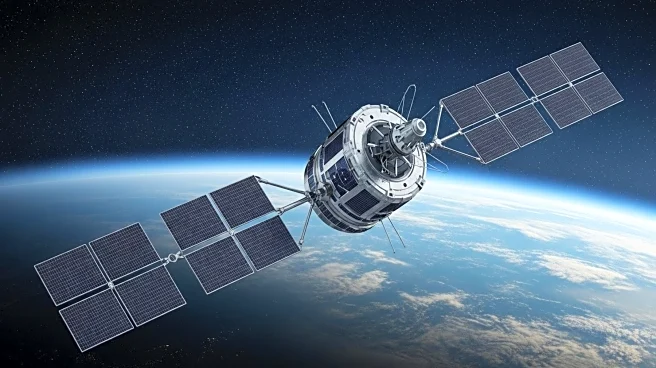What's Happening?
SpaceX successfully launched 28 Starlink V2 Mini satellites into low Earth orbit using its Falcon 9 rocket from Cape Canaveral Space Force Station. The launch occurred at 6:53 a.m. EDT, with the rocket following a north-easterly trajectory. The mission, named Starlink 10-27, aims to expand SpaceX's satellite internet constellation. The Falcon 9's first stage booster, marked B1085, completed its 11th flight and landed on the droneship 'A Shortfall of Gravitas' approximately 8.5 minutes after liftoff. This marks the 125th successful landing on this vessel and the 508th booster landing for SpaceX overall. The launch was supported by favorable weather conditions, with a 90% chance of clear skies, as forecasted by the 45th Weather Squadron.
Why It's Important?
The successful deployment of 28 Starlink satellites is a significant step in SpaceX's mission to provide global internet coverage, particularly in remote and underserved areas. This expansion of the Starlink constellation enhances the capacity and reliability of satellite internet services, potentially benefiting millions of users worldwide. The continued success of SpaceX's reusable rocket technology, demonstrated by the repeated landings of the Falcon 9 booster, underscores the company's leadership in cost-effective space exploration and satellite deployment. This advancement not only supports SpaceX's commercial goals but also contributes to the broader space industry by setting new standards for efficiency and sustainability.
What's Next?
SpaceX is expected to continue its aggressive launch schedule to further expand the Starlink network, aiming for near-global coverage by the mid-2020s. The company plans to launch additional satellites to increase bandwidth and reduce latency, improving service quality for users. As the constellation grows, SpaceX may face regulatory challenges and competition from other satellite internet providers. The success of these missions could influence future collaborations with governmental and private entities seeking reliable internet solutions. Additionally, SpaceX's advancements in reusable rocket technology may lead to further innovations in space travel and exploration.
Beyond the Headlines
The expansion of satellite internet services raises questions about the environmental impact of increased satellite launches and space debris. As more companies enter the satellite internet market, there is a growing need for international regulations to manage orbital traffic and ensure the sustainability of space activities. Furthermore, the deployment of satellite internet has cultural and ethical implications, as it can bridge digital divides but also raise concerns about data privacy and surveillance. The long-term effects of ubiquitous internet access on global communication and information dissemination remain to be seen.










